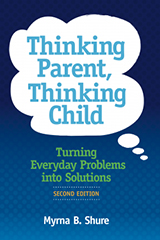The ROAD to ICPS -- AGES 4 TO 12
I Can Problem Solve:
An Interpersonal Cognitive
Problem Solving Program
Expanded Version
Early 1960s:
George Spivack and Murray Levine found that regardless of IQ, means-ends thinking, or ability to plan sequenced steps toward an interpersonal goal (e.g., making friends), and spontaneous tendency to weigh pros and cons to be superior in normal adolescents compared to the diagnostically disturbed. Cognitive skills dubbed Interpersonal Cognitive Problem Solving, or "ICPS."
Late 1960s:
Among normal youngsters with varying degrees of behavioral difficulties, Myrna Shure and George Spivack found deficiencies in ICPS skills of alternative solution and consequential thinking to be associated with impulsivity (impatience, overemotionality, aggression), and social withdrawal (timidity, inability to express emotions) as early as age four, and means-ends thinking as studied through grade 6. ICPS competence predicted concern for others' feelings and other prosocial behaviors.Early 1970s:
Myrna Shure began developing interventions to test Spivack's theory that ICPS thinking skills can guide behavior, rather than direct modification of behavior itself. First intervention - preschool.
Recognized need for specifically selected vocabulary words to help young children think the problem solving way, e.g., "is/is not," "and/or," "same-different," "before/after," "might/maybe" etc.,), and developed lesson-games to associate those games to questions designed for hypothetical children, e.g., "Can you think of a different way that (child) can get his brother to stop bugging him?" "What happened before Rudy called his friend a name?" "What happened after? "What might happen next if .. ?" etc.).
Recognized need to train teachers and parents to carry over this line of questioning when real problems came up (e.g. "Can you think of a different way to solve this problem?" "What happened before you hit him?" "What happened after?" etc). -- a style of talk Shure called "ICPS dialoguing" -- to associate thinking with behavior.
Mid-1970s - present
Continued developing and refining ICPS interventions (now called I Can Problem Solve (also ICPS) for preschool, for kindergarten and the primary grades, and for the intermediate elementary grades for two purposes: 1) to conduct longitudinal research to evaluate the impact of varying degrees of interventions an of different training agents (teachers and parents), and 2) to produce a set of easily absorbable manuals for the user - first published in 1974, for schools, 1992.
Over twenty five years of research, including several two- and three-year longitudinal studies, and one five-year longitudinal study (reprints available from M. Shure) has shown impact of ICPS interventions as primary prevention of early high-risk behaviors (as those mentioned above), behaviors research now shows predict later, more serious problems as violence, substance abuse, teen pregnancy, and school drop-out).


